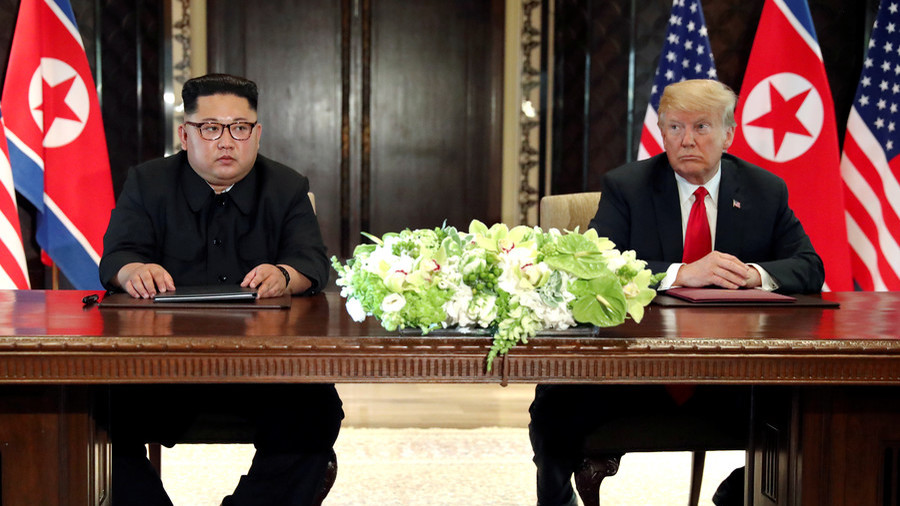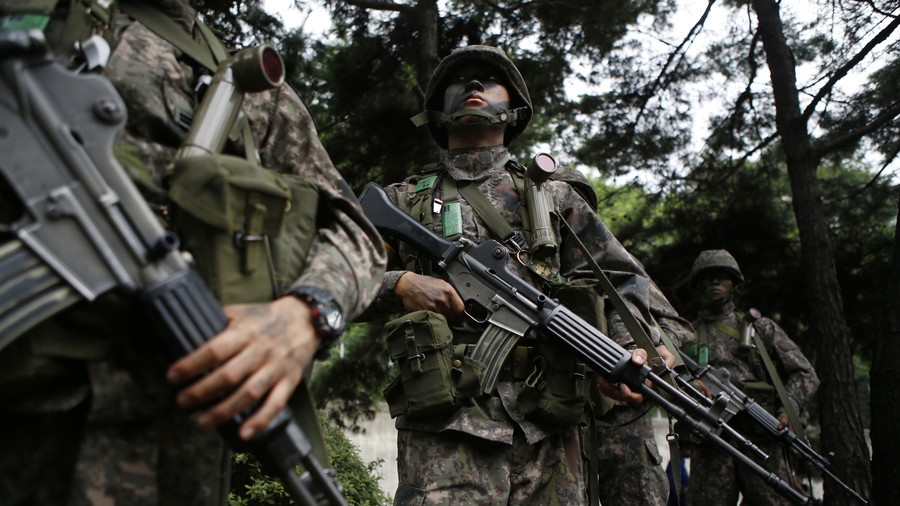Trump
flips on North Korea, declaring country still an 'extraordinary
threat'
President
extended the ‘national emergency’ for one year in an executive
order, re-authorizing economic restrictions

22
June, 2018
Donald
Trump has declared that North Korea still poses an “extraordinary
threat” to the United States, just days after saying that the
country’s nuclear program no
longer constituted a danger.
In
an executive order on Friday, the president extended for one year the
so-called “national emergency” with respect to the nuclear-armed
nation, re-authorizing economic restrictions against it.
While
expected, the declaration comes just nine days after Trump tweeted:
“There is no longer a Nuclear Threat from North
Korea,”
following his summit with North Korean leader Kim Jong-un in
Singapore.
Just landed - a long trip, but everybody can now feel much safer than the day I took office. There is no longer a Nuclear Threat from North Korea. Meeting with Kim Jong Un was an interesting and very positive experience. North Korea has great potential for the future!
The
order appears to undermine the president’s claim.
It
states that “the existence and risk of proliferation of
weapons-usable fissile material” and the actions and policies of
the North Korean government “continue to pose an unusual and
extraordinary threat to the national security, foreign policy, and
economy of the United States”.
The
national emergency has been in place since 2008 and is a sign of the
enduring tensions between the US and North Korea that spiked last
year as the North moved closed to perfecting a nuclear-tipped missile
that could reach American soil, but ebbed with the 12 June summit
where Kim agreed to “complete denuclearization” of the Korean
peninsula.
The
two sides, however, still have to negotiate the terms under which the
North would give up its nukes and win relief from sanctions – a
goal that has eluded US administrations for a quarter-century.
Trump
claimed at a cabinet meeting Thursday that denuclearization had
already begun, although his defense secretary, James Mattis, told
reporters a day earlier that he wasn’t aware that North Korea had
taken any steps yet toward denuclearization, and that detailed
negotiations have not yet begun
Despite
a recent thaw in relations with Kim Jong-un, President Donald Trump
is renewing US sanctions on North Korea for another year, justified
by “an unusual and extraordinary” nuclear weapons threat.
“The
actions and policies of the government of North Korea, including its
pursuit of nuclear and missile programs; and other provocative,
destabilizing, and repressive actions and policies… continue to
constitute an unusual and extraordinary threat to the United States,”
read a White House statement on Friday.
Washington
‘indefinitely’ delays 2 more military exercises with Seoul

RT,
23 June, 2018
The
US continues to wind down the scope of its military activity on North
Korea’s doorstep, with the Pentagon announcing on Friday it was
“indefinitely” suspending two joint training programs with Seoul.
The
exercises, which were scheduled to take place within the next three
months, have been put on hold with an open-ended date, Pentagon
spokesperson Dana White announced on Friday. The drills in question
are a part of the marine exchange training program between the US and
South Korea.
"To
support implementing the outcomes of the Singapore Summit, and in
coordination with our Republic of Korea ally, Secretary Mattis has
indefinitely suspended select exercises,” White said.
The
Pentagon also confirmed that the suspension of Ulchi-Freedom Guardian
war games that were set for August would last for an “indefinite”
period as well.
“This
includes suspending FREEDOM GUARDIAN along with two Korean Marine
Exchange Program training exercises scheduled to occur in the next
three months," the spokesperson said.
On
Tuesday, the South Korean Defense Ministry announced the allies
agreed to suspend preparations for the Ulchi-Freedom Guardian
exercise, which saw some 17,500 American troops and 50,0000 South
Korean troops participate last year.
The
South Korean ministry hinted that the allies were ready to cut back
their military operations in the region further, addressing the
long-held concerns of Pyongyang “should North Korea follow suit
with productive cooperation.”
Earlier,
the White House said that Washington would pause the drills for as
long as North Korea continues acting in good faith
Washington
and Seoul used to flex their military muscles with an array of joint
military exercises every year, each time sparking anger in Pyongyang,
which views large-scale hostile military activity off its borders as
a potential disguise for an invasion. Following the summit with North
Korea’s leader Kim Jong-un in Singapore, where US President Donald
Trump first promised to halt “very expensive” and “provocative”
drills with South Korea, he has doubled down on his pledge, saying
last week that it was his “request” to stall the preparations.
Trump noted that if the US proceeded with the drills while the
negotiations were underway, it would have cast a “bad light” on
the country.
In
the months before the Trump-Kim meeting, the US and South Korea
staged a number of joint exercises, including the annual Foal Eagle
drill in April that involved some 11,500 US troops and tens of
thousands South Korean troops.
The
Max Thunder drills in May, featuring US strategic bombers and stealth
jets, left the future of the summit hanging in the balance, as
Pyongyang called off talks with South Korea and threatened to do the
same with regards to the planned Trump-Kim meeting.
Despite
what is seen as a budding thaw in relations between the parties,
Washington is not in a hurry to ease its unilateral economic
sanctions against North Korea. On Friday, Trump renewed them for
another year citing “its pursuit of nuclear and missile,” while
branding it “an unusual and extraordinary threat to the United
States.” Pyongyang is also under several rounds of international
sanctions, which were adopted by the UN Security Council, targeting
its nuclear and missile programs.



No comments:
Post a Comment
Note: only a member of this blog may post a comment.